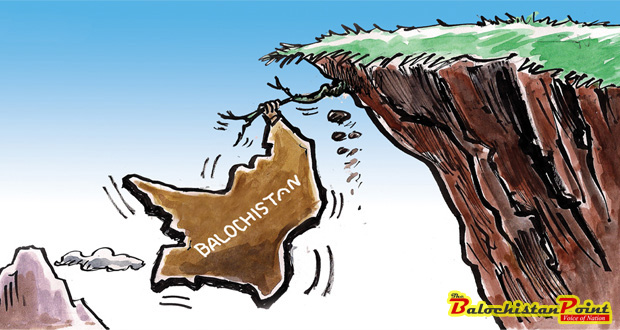Ayaz Ahmed
This is the first article in series of three articles on this topic.
Many pro-federalists felt highly triumphed when two disgruntled Baloch leaders, namely Shikari Marri and Madina Marri of the banned United Baloch Army (UBA) and Baloch Liberation Army (BLA), respectively, unwittingly surrendered their arms along with their 47 companions on June 14, 2015. They announced at a press conference that they had abandoned their anti-state activities and would serve the people as citizens of Pakistan. Their satisfaction further fastened when Deen Jan Alias Meeran and Obaidullah alias Babrak of the banned Baloch Liberation Front (BLF) and Lashkar-i-Balochistan, respectively, handed over their weapons to Senior Minister Nawab Sanaullah Zehri of the PML –N in the same month. Is this the slow but steady win of the central polity over the deprived Baloch? If yes, then what the federal government along with the Baloch nationalist provincial set up is planning to redress earnestly the escalating reservations of the province?
These insurgents-turned-peaceful citizens are still preoccupied with the venomous sense of absolute disappointment and inferiority complex due to the long denial of basic constitutional rights by all successive governments. This deeply seated disenchantment is undoubtedly the prime cause of low–level insurgency plaguing the resource-rich Balochistan. Arguably, it is not the solution of the convoluted malaise and complex predicament of Balochistan. In real sense, Balochistan’s genuine problems are multidimensional and deeply rooted in its deprivation of due political, socio-economic and other constitutional rights. Therefore it is imperative to identify these increasing issues and accordingly craft required policies and execute them aimed at creating political stability, economic prosperity and effective security situation.
Balochistan is Pakistan’s largest federal unit in terms of area spreading over an area of 347,190 Sq, Kms with 770 km coastline, which forms almost 44 per cent of the total area of Pakistan and it is least populated in terms of population with nearly 10 million people. It is important in terms of geo-strategy and geopolitics due to its proximity to the world’s most important shipping route, the Strait of Hormuz, where roughly 40 per cent of world petroleum passes ; it has close nearness to the Middle East which, according to the British Petroleum (BP), 2012 Statistical Review of World Energy, possesses 48 per cent of the world oil and 38 per cent of natural gas reserves; It, too, provides the nearest port access to the landlocked mineral rich Afghanistan that possesses mineral resources worth $3 trillion according to the Afghan government estimates and oil and gas rich Central Asian Republics (CARs) where only Kazakhstan and Turkmenistan have 3.6 billion barrels of proven oil and 663.8 trillion cubic feet of proven natural gas reserves and Kazakhstan also possesses 33.6 billion tons of coal reserves as per British Petroleum’s 2013 Statistical Review of World Energy and, lastly, Balochistan also shares border with Iran that owns 157 billion barrels oil and 1,187.3 trillion cubic feet of proven natural gas reserves.
Significantly, Balochsitan’s Gwadar deep sea port offers the world’s second largest economy, China, with an inexpensive, nearer and less perilous access to Africa, the Middle East and economically integrated Europe via the Suez Canal thus fostering tremendously Sino-Pak bilateral relations. In addition, the province itself is rich in precious mineral resources such as copper, black pearl, oil stones, coal, chromites and natural gas. In particular, Reko Diq, a small town of Balochistan’s Chagai district possesses 2.2 billion tons of gold and copper worth hundreds of billions of dollars.
Despite being the richest province of Pakistan in terms of natural resources, its inhabitants are living in abject poverty; it has the lowest literacy rate and the highest mortality rate in all over the country. In short, its human development index is unspeakably the lowest in all over Pakistan.
Arguably, such poor socio-economic conditions would induce people into resorting to extra constitutional means to attain fundamental constitutional rights. Despite introducing remedial socio-economic, political and educational reforms in the insurgency-hit province, the successive governments vigorously relied upon military operations in 1958-59,1962-63,1973-77 and ongoing one since 2005. Debatably, these operations have further alienated the disillusioned people of the province and therefore creating a potential field for the non-state actors to recruit jobless, hapless and discontented people massively and engage them in conflicts with the state. For that reason, it is indispensible to introduce far reaching educational, political and economic reforms in the province so as to make it inclusive politically, viable economically and improve its degenerating law and order situation.
Firstly, Balochistan is backward in terms of qualitative education. According to the Dawn, the literacy ratio of the province is dismally low at 39 percent and female literacy rate in certain districts is as low as less than 1 percent. A large number of children aged between 5 to 16 are out of school. Alif Ailaan, a non-profit organization working on education in the province, puts this number as 66%. Alarmingly, 42 percent of 10 to 18-year-old girls have never attended school. Moreover, Balochistan is lacking in adequate number of schools and trained teachers in order to increase both quantity and quality in this field. According to Sardar Raza Muhammad Bareech, the Adviser on Education to the Balochistan Chief Minister, there are 12,500 primary, secondary and high schools in the province where over 22,000 teachers are involved in educating children. Around 7,000 of these schools have only one teacher and one room for grade one to grade five.
(To be continued)
Author is a former assistant researcher at the Pakistan Institute of International Affairs (PIIA). He can be reached at AyazAhmed6666@gmail.com
Published in The Balochistan Point on August 8, 2015
Disclaimer: Views expressed in this article are those of the author and The Balochistan Point not necessarily agrees with them.
 Balochistan Point Voice of Nation
Balochistan Point Voice of Nation




